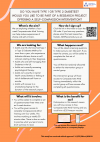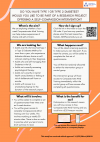- Messages
- 20
- Type of diabetes
- HCP
- Treatment type
- I do not have diabetes
An online, compassion intervention for adults with Type 1 or Type 2 Diabetes Mellitus (T1DM; T2DM)
What is the aim?
My name is Hetashi and I am a Trainee Clinical Psychologist. As part of my research, we are exploring whether a four-week Compassionate Mind Training can help reduce experiences of diabetes distress, shame and self-criticism.
We are looking for:
- Adults over 18 who have had Type 1 or Type 2 Diabetes Mellitus for more than a year.
- Adults who would identify as experiencing diabetes distress, shame or self-criticism in relation to their Type 1 or Type 2 Diabetes diagnosis.
- Adults who are self-managing their Diabetes in the UK.
- Adults not currently accessing psychological therapy.
- Adults not currently in mental health crisis/distress or experiencing thoughts of deliberate self-harm or suicide.
- You will be asked to complete a set of questionnaires three times (every four weeks).
- You will be given access to complete the Compassionate Mind Training, once a week for four weeks. This involves watching a weekly 30 minute video. There is also an audio to practise what you learnt and a short summary to read.
Click the below link to find out more about this research project and sign up:
https://cccusocialsciences.az1.qualtrics.com/jfe/form/SV_aWUJ7NiJ0OXbY34
What happens next?
- After reading the information sheet on the above link and signing the consent form, you will be asked some screening questions to make sure you are eligible to take part in the project.
- You will then be asked to complete the first set of questionnaires.
- After completing the questionnaires, you will be allocated to either the intervention group or control group.
If you are allocated to the control group, you will be given access to the Compassionate Mind Training after completing the questionnaires two more times.
What is the benefit for me?
Participation in this research means you will have access to free Compassionate Mind Training and you could win a £25 Amazon voucher.
If you have any questions, please email the researcher: [email protected].
This study has received ethical approval and this study has been approved for posting on this forum by the diabetes.co.uk Board.
Attachments
Last edited:






